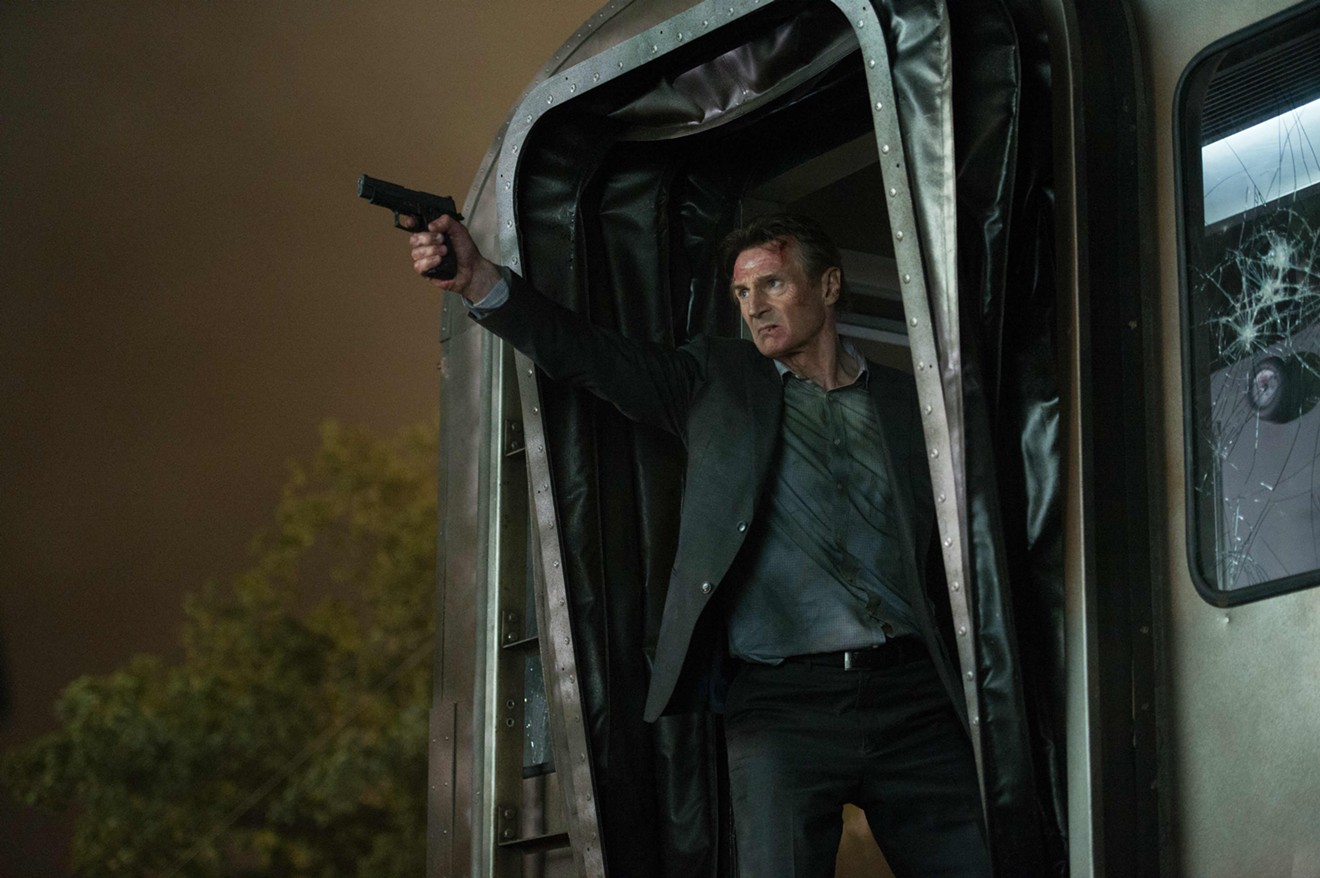Since Unknown (2011), the dog days of the movie calendar — January, February, March — have been the province of Jaume Collet-Serra and Liam Neeson, who together have seized this traditionally sleepy time at the multiplex with a batch of high-dexterity, pretension-free, heart-on-sleeve action-flick programmers. In The Commuter, the newest of the lot, Neeson faces a danger even that vaunted “particular set of skills” might not be enough to overcome: an America in economic panic.
For 10 years, Michael MacCauley (Neeson) — an ex-cop — has worked as an insurance salesman in New York City, dutifully providing for his wife (Elizabeth McGovern) and son (Dean-Charles Chapman) in the aftermath of financial trouble stemming from the 2008 meltdown. At the age of 60, on a day that begins like any other — a 6 a.m. alarm; a shave; a car ride to the Tarrytown train station on the Metro-North Hudson Valley Line — Michael gets canned (“a good soldier,” his boss terms him). Flung jobless into the mad swirl of midday Manhattan, with a spouse on the line inquiring about their kid’s college-tuition payments, Michael is shell-shocked — an existential state well-suited to the handsomely aged Neeson’s gaunt, somewhat gangly aspect. Later, Michael gets beers at an Irish bar with his former NYPD partner (Patrick Wilson); then, to catch the train home and somehow deliver to his family the depleting news, he hustles back to Grand Central Station, where an Alfred Hitchcock Presents–style dilemma awaits him. Joanna (Vera Farmiga), the mysterious high-heeled figure seated across from Michael on the train, promises a payday — $25,000 in a bag in the bathroom; another $75,000 in cash later — if the desperate family man can identify the passenger that Joanna claims doesn’t belong and is carrying a package of potentially fatal importance.
The Commuter proceeds much in the vein of Collet-Serra and Neeson’s earlier Non-Stop (2014), itself a race-against-time thriller of moral import set predominantly aboard a mass-transit vehicle (an airplane) hurtling through space. Again, Neeson’s weathered hero carries out his covert, life-or-death task amid an audience of initially unsuspecting everymen and -women, whom Collet-Serra sketches with Cliffs Notes efficiency: a pink-haired college student (Florence Pugh) bickering with her boyfriend; an old-timer (Jonathan Banks, last seen in Mudbound) who chats fondly about the Yanks and the Sox; a preening, Bluetooth-connected power broker (Shazad Latif) with a stint at Goldman Sachs on his resume. (When Michael learns of this backstory, he promptly curses the man out and gives him the finger, which is kind of Collet-Serra in a charming nutshell, quickly embellishing his gamely silly scenario with tossed-off wisdom from the 99 percent.) And as in Non-Stop, the camera (the cinematographer here is Paul Cameron) defies the laws of physics, swimming seamlessly from car to car with little regard for dumb things like walls or doors or floorboards; at times, it sweeps the interiors with such vigor it might be dusting for prints. In an act of particular formal glee, Collet-Serra sends the lens scurrying through the tiny holes that have been punched into the passengers’ train tickets.
Like many a Collet-Serra protagonist, Michael endures much punishment throughout The Commuter — some of it, as with one close-quarters battle involving a guitar, presented in spectacular extended-take fashion. Collet-Serra also delights in tormenting Michael with incongruous visual gags, like a splashy advertisement, posted on the side of a building in Harlem, insisting that “You could be home right now” — a pretty empty guarantee to a man in the thick of a conspiracy that could claim his or his loved one’s lives. (There’s also a sly shot where Michael looks at a smartphone screen indicating a caller ID of “Unknown,” a little hat-tip to the duo’s terrific Euro thriller.) Neeson withstands these diabolical details with the brusque sincerity and unforced swagger familiar from many of his late-career action assignments; he never leans too hard here on either his down-on-his-luck relatability or his post-Taken reputation as a telephonically gifted conveyer of justice.
The screenplay (credited to Byron Willinger, Philip de Blasi and Ryan Engle) is engaging but at times convoluted in its logistics, especially after the crystalline simplicity of Collet-Serra’s shark-versus-girl number The Shallows (2016). But, as ever, the director’s stylistic obsessions (harried close-ups of cell-service signal bars) and thematic integrity (witness the overworked 9-to-5 crowd banding together in solidarity) elevate the cheap paperback plot without tipping the movie over into pomposity. Indeed, Collet-Serra largely confines the emotional desperation that simmers throughout to the inventive and poignant opening-credits sequence, a series of jump cuts delineating the MacCauley family’s morning ritual. In one flash, Michael and his high-school-aged son are talking about Stanford and pulling all-nighters; in the next, about Syracuse and Lord of the Flies. In one moment at the Tarrytown drop-off, Michael and his wife laugh congenially; in the next, they weep and argue. The breakneck compression of this lived experience goes a long way toward cementing the resonance of the conflicts that follow; it’s also fundamental to the very appeal of The Commuter, which is a story of a routine gone awry — the kind of story that can only be fully sold if the routine itself is affectionately felt.
[
{
"name": "Air - MediumRectangle - Inline Content - Mobile Display Size",
"component": "18855504",
"insertPoint": "2",
"requiredCountToDisplay": "2"
},{
"name": "Editor Picks",
"component": "17105533",
"insertPoint": "4",
"requiredCountToDisplay": "1"
},{
"name": "Inline Links",
"component": "18349797",
"insertPoint": "8th",
"startingPoint": 8,
"requiredCountToDisplay": "7",
"maxInsertions": 25
},{
"name": "Air - MediumRectangle - Combo - Inline Content",
"component": "17105532",
"insertPoint": "8th",
"startingPoint": 8,
"requiredCountToDisplay": "7",
"maxInsertions": 25
},{
"name": "Inline Links",
"component": "18349797",
"insertPoint": "8th",
"startingPoint": 12,
"requiredCountToDisplay": "11",
"maxInsertions": 25
},{
"name": "Air - Leaderboard Tower - Combo - Inline Content",
"component": "17105535",
"insertPoint": "8th",
"startingPoint": 12,
"requiredCountToDisplay": "11",
"maxInsertions": 25
}
]











